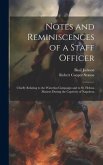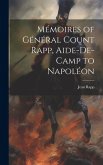A soldier before becoming one of the great scientists of the 19th century, Roderick Murchison's journals and letters of his wartime experiences have never been properly edited and published before as a single collection. They will add our knowledge of the British Army and Royal Navy attempts to keep Napoleon at bay in Spain and in Italy and to the final victory at Waterloo as ell as providing a fascinating social history of the times. "...this material is of great importance to scholars and students of the Napoleonic Era. Highly recommended for research libraries and personal collections." Professor Michael Collie, late University of Toronto Sir Roderick Impey Murchison (19th February, 1792 - 22nd, October, 1871), K. C. B., D. C. L., LL. D., F. R. S, F. G. L., etc., was one of the founders of modern geology. Using discernible fossil communities he established the Silurian, Permian, and, with Adam Sedgwick, the Devonian stratigraphic systems of geology. He extended his fieldwork to Europe and the Russian Empire and thus demonstrated the universality of the fossil-based stratigraphic systems that he had delineated in Britain. He gained fame by predicting gold in Australia, based on his findings in Russia where his coal discoveries ( made at the behest of the Czar) helped spur Russian railway development. Roderick Impey Murchison was twice president of the Geological Society of London (1832 - 1833 and 1841 - 1843), and was President of the Royal Geographical Society four times (1843 - 1845, 1851 - 1853, 1856 -1859 and 1862 - 1871). He also served one term as President of the British Association (1846) and became the Director General of the British Geological Survey (1855). He was awarded the Wollaston Medal of the London Geological Society (1864), the Copley Medal from the Royal Society (1849) and the Brisbane Medal from the Royal Society of Edinburgh. Sir Roderick established the Murchison Medal and fund, which is awarded each year by the Geological Society of London and the position of Chair of Geology and Mineralogy at the University of Edinburgh. Sir Roderick was also a member of the scientific academies of France, Russia, Germany, Sweden, Denmark, and Belgium among others. His leadership in geography was honoured by having numerous geographical places on earth named 'Murchison.' There is even a crater on the moon named Murchison to acknowledge his pioneering accomplishments in geology. However, before he was a famous geologist, geographer and 19th century British and European scientific leader, Roderick Murchison had a very different dream; he grew up wanting to be a career army officer, and desired to eventually attain the rank of General of the British Army. He spent the 10 years between ages 13 and 23 in uniformed pursuit of that goal. The Murchison Diaries covering the Napoleonic Wars have been edited by his descendant Dr. Arthur Murchison . The diaries begin with Ensign Murchison carrying his regiment's (36th Regiment of Foot) Colours into the bloody gun smoked chaos of a Spanish battlefield, French cannon and musket balls striking soldiers near him. Lieutenant Murchison survived the horrible retreat to Corunna and a frightening stormy sea voyage back to Britain. He served as a general's aide de camp in politically corrupt Bourbon Sicily during months of a booming artillery battle across the Messina Straits while he copied dispatches, studied opera music, watched a double hanging and made love. After a narrow escape from 'Algerine' pirates he returned to Britain and Northern Ireland were he was again his general's aide-de-camp. After Emperor Napoleon's first abdication in 1814 Captain Murchison visited France and found himself fleeing from Napoleon and his gathering army. Wanting to get back on the promotion generating battlefield, he became a cavalry officer but was disappointed because he did not see the final battle at Waterloo.
Hinweis: Dieser Artikel kann nur an eine deutsche Lieferadresse ausgeliefert werden.
Hinweis: Dieser Artikel kann nur an eine deutsche Lieferadresse ausgeliefert werden.








